
This article is more than
3 year old
As Adam Driver accidentally winds up 65m years ago, facing not just dinosaurs but an asteroid, we count down the best films about going backwards, or forwards, through the ages
Regardless of what anyone says, I believe in my heart that Timecop was greenlit because someone showed a studio executive a picture of Jean-Claude Van Damme and said the word “Timecop” out loud, at which point they had to throw a script together as quickly as possible. Nothing about Timecop makes sense. It is the most 90s film ever made.
I have to be careful here, because Tenet might not be a time-travel movie. Certainly time passes in it and some of the people are going backwards in time in it. But I’ve seen this movie twice now, and it mainly just seems to be about people mumbling everything, except for Kenneth Branagh, who gets to shout very loudly three times. Anyway, here it is.
Finally, a film that uses time-travel for the correct reason; to allow a horny 1980s high school student to go back to prehistory so that he can convince a smoking hot, bikini-wearing cavegirl to have it off with him. You will note I’ve ranked this above Tenet.
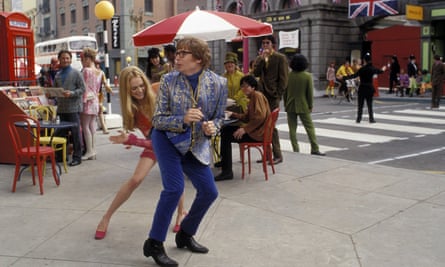
Weird to think that Austin Powers was originally a fish-out-of-water comedy, in which the promiscuous titular character had to navigate the (then) uptight world of the 1990s. That all fell apart for the sequel, where Powers was sent back to the 60s to shout his catchphrases at people who actually appreciated them. That makes it a time-travel movie, right?
God, this film. In summary: Ashton Kutcher plays a man who experiences blackouts, only to learn some years later that he can travel back in time and inhabit his younger self’s mind during the blackouts. But in doing so, he unleashes a world of unintended consequences. He becomes a murderer and loses limbs. Seek out the director’s cut if you can, because it ends with Kutcher’s character deliberately strangling himself in the womb with his umbilical cord. No, really.
Wherein Chris Pratt is drafted into a war that takes place 26 years later, because the invading aliens have already killed all the soldiers who were alive at the time. It’s a great premise for a film – we all pay the price for the actions of other generations – let down by a truly confusing ending. Admit it, you forgot this film even existed, even though it cost $200m to make and only came out 18 months ago.
A 1964 movie made on the cheap with genuinely terrible effects, The Time Travelers is about a group of scientists who travel to the future, fight some mutants and then return. What sets it apart, though, is its crazed ending. The film ends with the scientists venturing into the distant future, whereupon the film plays through again, faster and faster and faster until it cuts away to a still of the galaxy. Are they trapped in a loop? Is free will an illusion? Did the producers just run out of money? We may never know.
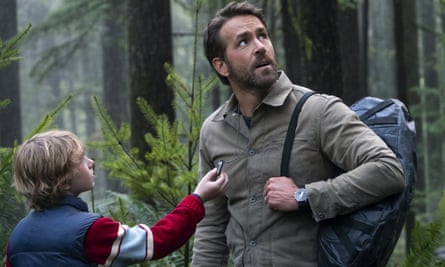
In which a young boy’s life is turned upside down when he is visited by an older version of himself from the future. The good news? He grows up to be a fighter pilot. The bad news? He also grows up to have all the cadences and surface-level snarky patter of Ryan Reynolds. What follows is a buddy movie where the two buddies are the same person.
So seminal that it was namechecked in Avengers: Endgame. A flat-out comedy that primarily exists to allow a bunch of middle-aged men to act like teenagers, Hot Tub Time Machine is a film about an enchanted Jacuzzi that sends people back to the mid-1980s. Possibly a bit too bawdy for its own good, there’s a hint of a message about the unreliability of nostalgia here.
This family film involves a young boy who goes missing in a Fort Lauderdale ravine, only to show up eight years later having not aged. There are UFOs and rubbery little creatures and whatnot, but there’s a real emotional wallop to the moment when the boy realises that the world has moved on without him, right down to the scene (that plays out like a horror movie) where the boy realises that his parents have become unrecognisably ancient, even though they are probably only in their early 40s.
Some see Shane Carruth’s Primer as the gold standard of what a time-travel film should be. It’s the sort of movie that seems unnervingly realistic, from the down-at-heel engineers to the unshowy nature of time travel itself, where people in effect just get in and out of some boxes. Almost entirely unwilling to explain itself, for years Primer fans have come to rely on a series of graphs and charts to figure out what the film actually is.
A time-travel movie that may or may not have any actual time-travel in it, Colin Trevorrow’s Safety Not Guaranteed is a delicate wonder of a thing. A man places an ad in a magazine asking for a time-travel companion – “Must bring your own weapons. I have only done this once before” – and the respondents slowly come to realise that all is not quite as it seems.
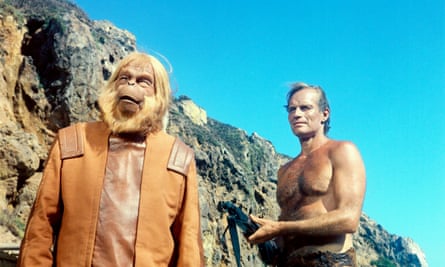
If you haven’t seen Planet of the Apes, then the fact that I’ve put it on a list of time-travel movies is probably quite a heavy spoiler, and for that I’m sorry. But what a reveal this is – what seems at first like a silly movie about Charlton Heston being persecuted by some monkeys quickly becomes something darker and much more sinister. That new Adam Driver movie probably could have achieved something similar, if it hadn’t blabbed its big secret in the trailer.
Endgame is a lot, so much so that it is effectively a time-travel movie bookended by two entirely separate movies. And, yes, it takes a lot of liberties with time-travel, from Tony Stark’s “Huh, I did it” invention to the lazy referencing of other time-travel movies as a shorthand for what the characters can do. Nevertheless, when they get to it, the film nails it. The Battle of New York is the obvious highlight, with Captain America fighting Captain America and the Hulk embarrassed by his unreconstructed former self, but the heart of the film really comes when Tony meets his father as a man and learns to let go of the past.
Interstellar is also a lot. But at its core is a simple ethical quandary: would you try to save the world if it meant missing your children’s entire lives? Matthew McConaughey has to touch down on a planet during a space trip. The problem is that every hour he spends there is equal to seven years on Earth. Is the trip important enough for him to miss seeing the wonder of his children grow into adults? Technically, if you want to be fussy about this, Interstellar is a time dilation movie rather than a time-travel movie. But it gets a pass, largely because McConaughey sells the agony of the moment so beautifully.
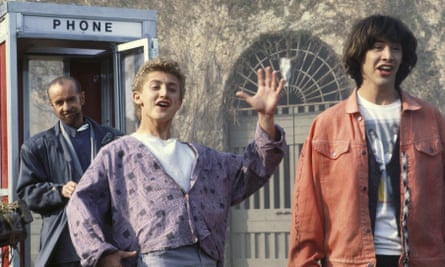
There are times when Bill and Ted’s Excellent Adventure feels like it was written by a toddler off his face on pop. But that’s a deliberate ploy, a way to camouflage all the careful rigour that underpins the script. The lead characters are initially reluctant to embark on their time-travel adventure, until they’re visited by versions of themselves from the near future who compel them to do it; a beautiful and hilarious example of predestination in action. Extra points are awarded thanks to the film’s total lack of interest in consequences. Swiping Abraham Lincoln and Napoleon from their respective eras has no bearing on world history whatsoever, which is probably quite lucky.
One problem with time-travel movies is that the rules always need to be explained upfront. In lesser hands, this can lead to all manner of clunky, stilted exposition. But when Rian Johnson dabbled in the genre with Looper, he gave us a masterclass in “show, don’t tell”. The sequence where poor Paul Dano’s character is tortured at two different points in time simultaneously, with the older version following instructions carved into the younger version’s arm, is arguably one of the most inventive uses of time-travel in the entire history of cinema. All that plus this is Bruce Willis’s last truly great performance.

The lure of the first two Terminator movies were the killer robots running around murdering everyone. But they were very smartly built around a framework of pure time-travel. We only see the future in brief flashes, but what’s important is the present. It is very, very important that Kyle Reese (a guy from the future) has sex with Sarah Connor (a woman from the present), because only that will save humanity as we know it. It’s a hell of a pickup line, but the device also elevates what could have simply been a shonky B-movie into the realm of the classics.
The smartest time-travel movies use the device as a mirror, telling us more about the times we live in now than the times the characters visit. Enter Idiocracy, Mike Judge’s stinging satire about modern times. An average person is cryogenically frozen and wakes up in the future, shocked to discover that the global IQ has fallen off a cliff in the intervening years. Surrounded by aggressive stupidity, he single-handedly saves the US from famine by suggesting that they use water – and not an electrolyte drink – to grow crops. We are conservatively 15 years from this happening in real life.
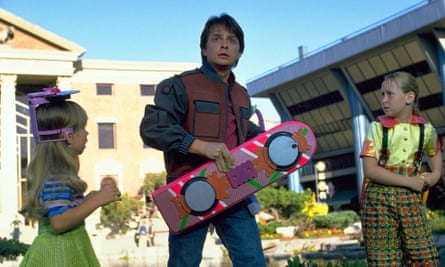
The only conceivable first choice. The first two Back to the Future films (the third, which is basically just a western, is far less imaginative) have come to define time-travel as a genre. They deliver a complex set of hard sci-fi rules about what can and cannot happen during time-travel and – miraculously – manage to do it in a way that kids can understand. Good music, cool clothes, a million catchphrases and, in the case of the second film, an unnervingly prescient prediction of how Donald Trump would turn out. Just perfect.